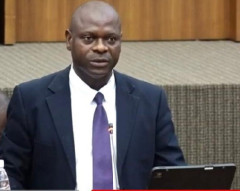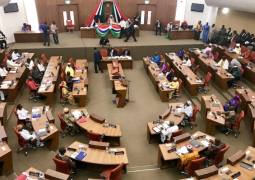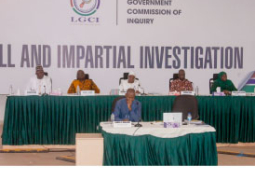
The defenfce came in response to a lawsuit filed against the Clerk of the National Assembly, the Minister of Finance and Economic Affairs, and the Attorney General.
The case was brought forward by four plaintiffs, Sait Matty Jaw, Madi Jobarteh, Coach-Pasamba Jow, and Baboucarr Sufism Nyang, who argued that the National Assembly violated constitutional provisions by accepting the late tabling of the 2025 budget.
They were seeking for the Supreme Court declaration that the National Assembly’s decision, through the Speaker, to allow the budget’s late presentation contravenes Section 152 (as amended) of the Constitution. They also wanted the late submission declared null and void, along with any subsequent legislative actions based on it.
Appearing before a five-judge panel of the Supreme Court, State Counsel Oketa, representing the Clerk, the Finance Minister, and the Minister of Justice, called for the case to be struck out. He challenged the court’s jurisdiction, citing the Assembly’s procedural independence.
Oketa argued that the Speaker’s decision was procedural and aligned with Order 8 of the National Assembly Standing Orders. This provision, he said, empowers the Speaker to make procedural determinations in the absence of explicit rules, guided by constitutional law, legal precedent, and Assembly practices, both domestic and international.
He further pointed out Section 108(2) of the Constitution, which bars courts from questioning decisions or acts of the National Assembly or the Speaker under its Standing Orders. According to him, this clause takes precedence over other provisions, including Section 152.
Counsel Oketa maintained that the 2001 amendment to Section 152, which requires the National Assembly to approve the budget within 14 days of its presentation, does not indicate that delayed submission nullifies the Assembly’s authority to consider or approve it.
In addition to the legal arguments, Counsel Oketa emphasised the need for a purposive interpretation of the Constitution, underscoring the importance of maintaining government functionality.
According to Oketa, denying the budget based on timing would severely disrupt government services, which would not serve the public interest. He added that interpreting constitutional provisions solely based on literal deadlines without considering the broader purpose would be unreasonable.
He also questioned the substance of the plaintiffs’ claims, arguing that they are more academic than practical. In addition, he asserted that the budget’s approval was essential to prevent a shutdown of government operations, and that the late submission, while not ideal, did not undermine its legality.
He concluded by asking the Supreme Court to dismiss the case, as he believes the plaintiffs’ arguments lack merit.





